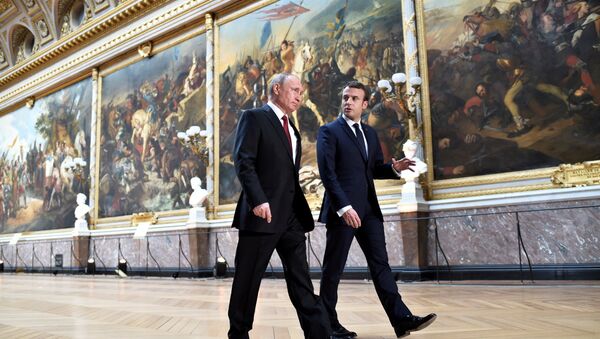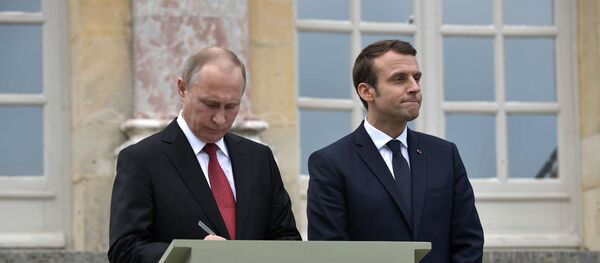MOSCOW (Sputnik) — The meeting of Russian President Vladimir Putin and his French counterpart Emmanuel Macron held in Versailles, France, on Monday, was an attempt to direct the relationship between the two countries toward solving existing problems and a sign of possible warmer ties in the future, experts told Sputnik.
New Trajectory for Relations
Improvements in the French-Russian relationship may be expected, but it will take time, according to Isabelle Facon, a researcher at the French Institute for International and Strategic Research.
"We can expect some warming of the relationship, which was not really good in the past several years. The difference in the position on Ukraine and Syria, the fact that Russia showed its preference first for [Francois] Fillon, then to [Marine] Le Pen [as presidential candidates], affected the relations which have not been stably good and we need to cure them. It is a good development, but it cannot guarantee the rapid progress in the French-Russian relationship; it's an attempt to put them on a more open track," Facon told Sputnik.
Facon added that Macron, who is likely to base his foreign policy on cooperation with the European Union, in this case acted as a sort of messenger, meeting the Russian president right after the G7 and NATO summits, held on May 26-27 and May 25, respectively.
"The foreign policy of Macron will develop in the framework of the European cooperation, privileged by the president. So Putin is received, but received after Macron had a discussion with Angela Merkel, NATO allies and the G7 leaders first. He is rather a message carrier to show how the things are seen and understood in the EU and [NATO]. There is still the idea that it is necessary to integrate Russia on the European scene, but on the condition that Russia will be ready to soften its position on a certain number of subjects," Facon said.
Holding a meeting with Putin as soon as possible had been one of Macron's priorities due to the need to determine France's approach to mediating between Russia and the United States, Gen. Dominique Trinquand, formerly the head of the French military mission to the United Nations, told Sputnik.
"I think that President Macron insisted on holding this meeting as soon as possible to discuss the urgent issue: France is between Moscow and Washington and it facilitates a dialogue between them… The meeting [with Putin] that had to take place in October 2016 at the opening of Russian Orthodox church [in Paris], and President Macron wants to lead dialogue with Russia now — this is a non-changing principle," Trinquand said.
In October last year, Putin canceled a visit to France, during which he was supposed to meet then-President Francois Hollande and stop by a Russian Orthodox cathedral, built on the bank of the Seine river in Paris next to the Eiffel Tower. The cancellation happened after some events were dropped off the schedule for the visit, according to the Kremlin.
Sanctions
Emmanuel Dupuy, the president of the Paris-based Institute for European Prospective and Security (IPSE), told Sputnik Macron understood that a tense relationship with Russia had a negative impact on the economy.
"[The French] President said that 500 French companies are working in Russia, and France is the largest [foreign] employer in Russia, if one does not count neighboring countries. There are also new possibilities, in particular, in terms of industrial partnership. For example, Russia is interested in a partnership with Airbus," Dupuy told Sputnik.
According to the expert, while some might consider the meeting with Putin a mistake for Macron, it was a logical continuation of a 300-year-old tradition of diplomatic relations between the two countries. Dupuy said that the timing of the meeting, right after the G7 summit and ahead of G20 meeting scheduled for July 7-8, was very important.
"I think Emmanuel Macron understands well that it is necessary to ensure equilibrium in the relationship with Russia, especially in the connection with the relationship with the United States that has suddenly become more complicated," Dupuy said.
According to Trinquand, France, unlike other European countries, was rather likely to lift anti-Russian sanctions.
"France is attempting to change the situation. Other countries, such as the United States, are trying to persuade some EU countries to keep sanctions. Besides, some countries of Central Europe are still worried about what is happening close to their borders and only 30 years ago were bound by the Warsaw Pact," Trinquand said.
The United States, the European Union and several other countries introduced several rounds of sanctions against since 2014 in response to Moscow's alleged meddling in the conflict in Ukraine. Moscow has repeatedly denied interference in the conflict in eastern Ukraine.
Conflict in Syria
Both Trinquand and Dupuy believe that Macron and Putin might be able to find a common ground on the issue of the Syrian conflict.
Trinquand pointed out that both French and Russian leaders noted the fight against extremists in Syria would only be possible under an efficient government.
"The issue then arises, of course, of who would be in that government, but that is another question altogether," Trinquand said.
According to Dupuy, there were no contradictions between the positions of the French and Russian sides, as both wanted a settlement process for Syria.
"The issue of the chemical weapons has really worried Russia… Russia urged the global community to think about the restoration, called on all parties to the conflict to lead the dialogues in Geneva and in Astana and to form an inclusive government. I do not see any big differences from the position of Emmanuel Macron," Dupuy said.
According to the expert, Putin seemed in favor of moving from a military stage to a diplomatic one.


